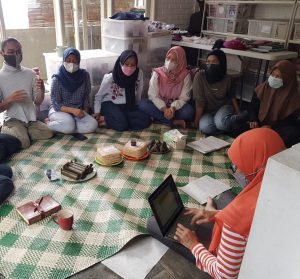Indonesia for Humanity, Indonesia
With two GFCF grants, Indonesia for Humanity (IKa) has been developing its own unique approach to evaluation and learning which they describe as: “An alternative to the lifeless model that over-simplifies our work.” Ika’s eagerness to test new approaches stemmed from its dissatisfaction with the available monitoring and evaluation systems, which they saw as extractive and reductive in terms of capturing complex work. These systems also served to reinforce unhelpful hierarchical relationships between “donors” and “grantees.” IKa was therefore intent on creating a new approach that put its network of partners at the very heart of the learning process. Rather than simply evaluating individual grants or programmes, IKa was also clear that its approach to evaluation should assess how effective the work of its network – advocating for well-being for all within the framework of democracy, rights and environmental sustainability – had been over two decades.
The result is Pemaknaan. Based around the root word makna (meaning), Pemaknaan is a participatory way to find the deeper meaning or impact of an initiative through dialogue that builds understanding and encourages constructive observations. IKa also created an entirely new word, Pemakna, which they understand to mean the person who carries out the giving of meaning. The use of Indonesian grammar and vocabulary was an intentional way to root the process in the local context.
What Pemakna seek to measure is the transformative capacity of IKa’s partners and their initiatives. As commented by Kamala Chandrakirana, an IKa Executive Board Member: “Transformative capacity means having the intention, strategy and capacity to take preliminary or intermediary steps to achieve transformative change.” This is an important clarifier given that IKa provides relatively small funding support to grassroots organizations. But, altogether, their goal of social transformation is enormous and long-term. So it was important for IKa to identify an approach to measurement which recognizes that small amounts of resources can serve to contribute to long-term change.
Pemakna include seasoned activists and thinkers who are active in their communities, and who bring to the Pemaknaan process deep knowledge and experiences around working towards social change. The strength of the approach lies in the subjectivity of the Pemakna who bring specific understandings of complex realities. This is in opposition to more traditional evaluation approaches that demand objectivity.
For IKa, Pemaknaan is not only a strategy for preserving their integrity and authenticity through language and process, but it also affirms and regenerates its movements’ collective energy and autonomy. IKa’s experience in developing new ways to measure what matters is important learning for many in the GFCF’s network who aim to both engage meaningfully with their networks, and to understand how small, short-term grants can contribute to lasting movement or system-wide change.
Since 2021, the GFCF has made four grants to IKa, totaling US $76,750.


